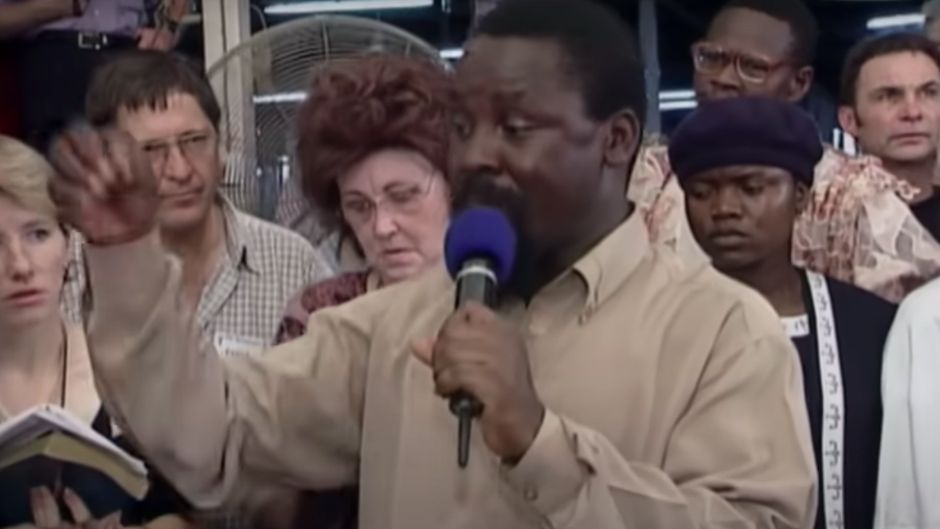Nigerian evangelicals on the T.B. Joshua case: “There is a lot of defence of both him and his organisation”
The issue has gone unnoticed in Nigeria, “perhaps because of the patronage Joshua enjoyed among senior government officials, politicians and celebrities”.
Protestante Digital · ABUJA · 16 FEBRUARY 2024 · 11:25 CET

Two and a half years after his death, the BBC has released a series of reports and interviews linking the Nigerian televangelist T. B. Joshua to dozens of cases of sexual abuse, rape and forced abortions.
According to the two-year investigation, the former leader of the Synagogue Church of All Nations (SCOAN), established in Nigeria and which gathered 15,000 people at its Sunday services, was accused by dozens of women from countries such as the United Kingdom, Germany, South Africa, Ghana, the United States, Nigeria and Namibia, of abuse in a secret facility in Lagos over a period of 20 years.
Among the voices featured on the BBC is that of Ajoke, one of the daughters Joshua reportedly had with one of the women who attended his church, who renounced her last name and now lives in a secret location.
She has reported beatings by her father, explaining that he beat her with belts and chains.
“I wonder how I lived at that time. I couldn't even stand for days because of the beatings, I couldn't even shower. I couldn't even take a shower. He tried so hard to make people not even listen to me”, Ajoke says in one of the interviews.
SCOAN, which is currently led by the widow of T.B. Joshua, Evelyn, claimed that all allegations prior to the death of the televangelist were unfounded.
The church received some media attention in 2014 after the collapse of part of its facilities, which caused the death of at least 44 people. At the time, Joshua accused the jihadist organisation Boko Haram.
“We thought we were in heaven, but we were in hell”
Among the victims covered by the BBC investigation, the British media pays special attention to the case of Rae, who was in the group of at least 150 people who joined Joshua as disciples at his Lagos facility over the decades.
“We thought we were in heaven, but we were in hell, and terrible things happen in hell”, says Rae, who has reported being sexually abused by Joshua and also accuses him of holding her in a kind of solitary confinement for two years.
Between the 1990s and the early years of the 21st century, thousands of “pilgrims” from America, Europe and Southeast Asia travelled to Nigeria to meet the community Joshua had formed and to see in person the “miraculous healings” he advertised in his ministry, which also brought him controversy.
Interview with the Evangelical Alliance of Nigeria
In the light of this information, Spanish news website, Protestante Digital has contacted James Akinyele, secretary general of the Nigerian Evangelical Alliance (NEF), an entity that belongs to the World Evangelical Alliance.
Question: What is the impact of the reports of the T.B. Joshua scandals in Nigeria?
Answer: The impact is minimal. Actually he was never part of the mainline church in Nigeria (neither Pentecostals nor Evangelicals), so there was no official endorsement of his organization.
Q: How does this situation damage the evangelical witness in Nigeria?
A: According to our research, it basically hasn't done much to damage the gospel witness, beyond the existing scepticism already associated with the church, especially with the Pentecostals.
Q: How have Christians of other denominations and churches reacted to the latest news about the abuses committed by T.B. Joshua?
A: Strangely enough, there is no known official response, apart from comments on social media. There has been some critical comments on these reports.
Sadly, there is equally a lot of defence of both T.B. Joshua and his organization especially by his large followers, some of whom continue to belong to their churches while following Joshua's organisations.
The reasoning is that he is dead and therefore cannot defend himself. Some even argue that the BBC represents an anti-evangelical ideology and has only chosen Joshua's Synagogue as a scapegoat.
Others argue that those accusing him are the ones who controlled the organisation along with Joshua and were displaced by his wife, and are therefore out to discredit the organization.
Q: Do you think people will totally turn away from Christianity after what happened, or rather turn to other churches and denominations?
A: Joshua's followers in Nigeria are largely unmoved, according to their responses on social media.
Perhaps the the patronage he enjoyed during his life among top government officials, politicians and celebrities has also explained the apparent indifference to the scandal.
His humanitarian works and his strong media influence make it even more difficult for people to leave his organisation, now under the leadership of his wife.
The international bodies, especially evangelicals who endorsed T.B. Joshua's activities, should be advised to clarify the situation regarding evangelical alliances in each country before making such endowments or partnership.
One more year
Learn all about our #OneMoreYearEF campaign here (English).
Published in: Evangelical Focus - world - Nigerian evangelicals on the T.B. Joshua case: “There is a lot of defence of both him and his organisation”
